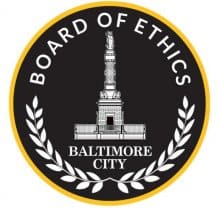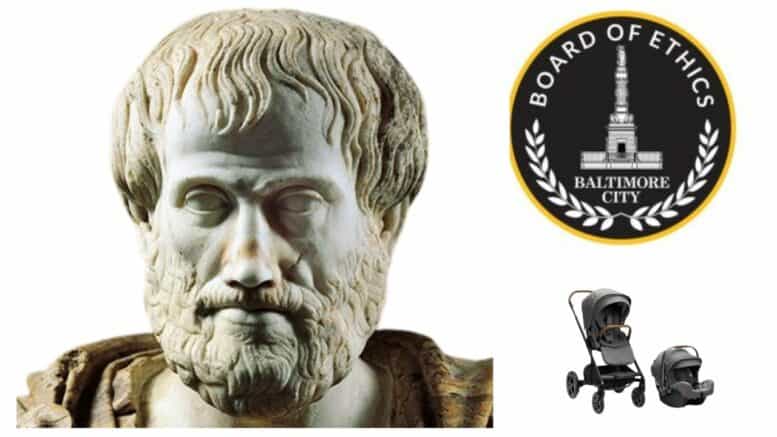In a recent Baltimore Brew article, Baltimore City Mayor Brandon Scott and his fiancée, Hana Pugh, have set up a public online baby registry soliciting gifts, cash, and supplies for their newborn son.
ICYMI: Mr. Scott and Ms. Pugh welcomed baby Charm on December 26, 2023.
Salute’ to Mayor Scott and Ms. Pugh!

From a practical viewpoint, the ethics of Mayor Scott’s public baby registry hinges on its consequences.

If the registry harms public trust or creates conflicts of interest, particularly with the mayor’s donors potentially benefiting from the mayor’s decisions, his baby registry undermines the public good.
However, this could be seen merely as a personal celebration without any negative impact.
Aristotle’s Virtue Ethics: A Reflection of Character
Remember Aristotle?
He’s an ancient Greek founding figure behind political science, political philosophy, and virtue ethics. His emphasis on virtue ethics is squarely on the character and virtues of an individual.

Aristotle proposed that virtues like integrity, prudence, modesty, and temperance are essential for ethical conduct, especially for public figures.
The public nature of the mayor’s baby registry, especially with some of the more high-priced items, could be considered incongruent with virtues like modesty or temperance.
Examining the Integrity of Mayor Scott’s Baby Registry
Integrity involves honesty and consistency in one’s values, actions, and principles.
I am a former Boy Scout.
As I recall, my late Scoutmaster, Jack McCarter of Troop 100 in Hagerstown, told us young Scouts, “Integrity is doing the right thing when no one is looking.”
Of course, I’ve had ethical lapses throughout my lifetime. But who hasn’t?
But when a public figure like Brandon Scott sets up a baby registry (for personal gain), Scott’s constituents may have reason to question the consistency of his actions.
For instance, if the mayor has advocated for modest living or criticized public displays of wealth, soliciting expensive gifts may contradict these values, allowing the public to scrutinize the mayor’s integrity rightfully.
Is the Brandon Scott Baby Registry Prudent?
Prudence, or practical wisdom, is another virtue central to Aristotle’s ethics.
It involves making wise decisions that reflect sound judgment, especially in complex situations.
In the context of Scott’s baby registry, prudence would dictate a careful consideration of how the public and the potential implications that such a public solicitation could have on the mayor’s ability to govern effectively.

So, is Brandon Scott acting prudently?
Are there other discreet methods of celebrating the birth of Scott’s new baby without him risking the perception of using his public office for personal benefit?
A Public Baby Registry? Is it Modest?
The virtues of modesty are particularly relevant, given the *public* nature of the mayor’s baby registry.
Modesty implies a certain level of restraint in one’s actions and desires or, perhaps, avoiding excess or flamboyance.
Including high-priced items on the registry, such as a $1,229.90 stroller travel system, could be seen as a departure from modesty, suggesting a preference for luxury and extravagance.
What About Temperance?
Temperance advocates for moderation and self-control.
A temperate approach would limit one’s desires and requests to what is necessary or reasonable, especially in a public context.

Publicly soliciting a wide array of expensive items could be interpreted as a lack of temperance, as it may appear to be an excessive indulgence in personal desires, utilizing the mayor’s public platform.
Ethics of Care and Community Engagement
This approach focuses on relationships and care and might see the registry as a way for the mayor to involve the community in a significant personal event.
By inviting people to join in this life event, Mayor Brandon Scott could create a feeling of togetherness and happiness, bringing himself closer to the people he leads as the mayor of a big city.
Power and Political Dynamics
However, the mayor’s seemingly benign act of community engagement could become complex when viewed through the lens of power dynamics inherent in the relationship between a public official and constituents.
By virtue of his position, Mayor Scott holds significant power and influence.
When such a public figure solicits gifts, even for a glorious personal occasion such as the birth of a child, it can create an ethical problem.
While intended for a private celebration, the registry’s public nature invites interpretations of exploiting the mayor’s office for personal benefit.
Including expensive items in the registry heightens this concern, as it could appear to leverage public office to obtain luxury goods that might otherwise be out of reach.
Avoiding The Appearance of a Public Conflict
The ethical challenge is compounded by the need to maintain transparency and avoid conflicts of interest.
If individuals or groups with pending decisions or interests before the city government contribute to the registry, it could create a perception of impropriety or quid pro quo, regardless of the mayor’s intentions.
The ethics of care may see the mayor’s baby registry as fostering community engagement.
However, issues like power dynamics, potential exploitation, and the need for clear ethical boundaries in public office complicate the situation.
These factors must be carefully considered to ensure that personal joy and public responsibility remain distinct and unviolated.
Ross’s Prima Facie Duties and Rawls’ Justice Theory
William David Ross‘ theory of prima facie duties offers a more nuanced ethical framework for analysis.
Ross’s theory emphasizes the existence of multiple, often competing, moral obligations or duties that must be balanced against each other.
Let’s break this down about the mayor’s situation:
Fidelity
This duty involves keeping promises and being truthful.
In the context of the mayor’s baby registry, fidelity would relate to maintaining trust with the public.
By soliciting gifts, the mayor must navigate this duty carefully to ensure that his actions do not betray public trust or create a perception of dishonesty or misrepresentation.
Reparation
This duty concerns making amends for wrongdoings.
While not directly applicable in this scenario unless the registry is later deemed inappropriate, it’s a duty that the mayor might need to consider if the registry negatively impacts his constituents’ trust.
Justice
This is crucial in the mayor’s case.
Justice involves treating people fairly and avoiding actions that others could deem unfair or biased.
The ethical challenge here is to ensure that the registry does not create or imply any unfair advantages or opportunities for those who contribute, thus avoiding any misuse of his public role.
Beneficence
This duty refers to doing good and acting in the interests of others.
The mayor, in creating a registry for his newborn child, could be seen as fulfilling a duty of beneficence towards his family.
However, he must balance this duty with his duty to the public.
Self-Improvement
This duty involves working on moral, intellectual, and physical improvement.
A mayor’s need to regularly reflect on and improve their ethical decision-making in public office becomes clear.
Though it’s not directly related to Scott’s baby registry.
A parent setting up a registry for their newborn may appear to be trying to provide for their child (beneficence).
However, by making the registry public, Mayor Scott might give an impression of injustice or misuse of his public role, especially if those involved in city affairs can access it.
Therefore, according to Ross’s theory, the mayor’s ethical challenge is to balance these duties by doing the following:
- Ensuring that his desire to provide for his child does not compromise his responsibility to maintain fairness;
- Avoiding conflicts of interest;
- Upholding the public trust inherent in his role as mayor.
This balancing act is crucial in maintaining ethical integrity in public office, especially when personal and public spheres intersect.
The Role of Local Ethics Boards and Contextual Considerations
While the Baltimore City’s Ethics Board has issued no opinion as of December 27, it is noteworthy that the Board’s director, J. Christoph Amberger, told The Brew that Brandon Scott’s public baby registry is not a prima facie (or at first glance) violation of the City’s ethics laws.
Amberger stated that the mayor’s actions haven’t crossed the ethical boundaries defined by the laws for public officials.

This statement is a crucial starting point to evaluate the mayor’s conduct.
Yet, assessing the ethics of public officials’ actions usually goes beyond just following the written laws.
This is where the situation with the mayor’s baby registry becomes more complex and layered, which we discussed above.
Stay Informed About Those Who Govern You
In our analysis of Mayor Brandon Scott’s baby registry, we explored the ethical dimensions from multiple theoretical perspectives.
- First, we examined the implications through utilitarian, deontological, and virtue ethics, highlighting public trust and integrity concerns.
- Second, we scrutinized the power dynamics and potential conflicts of interest in such public solicitations.
- Finally, we considered the broader impact of setting precedents for ethical standards in public office.
As citizens and observers of political ethics, it’s crucial to remain vigilant and engaged in discussions about the conduct of our public officials.
Consider the complexities of these ethical dilemmas and how they shape your perception of public service.
Your job as citizens is to stay informed about the actions of those in power. You can do that by reading A Miner Detail!
Your engagement is vital in upholding the integrity of public office, especially in matters related to the Brandon Scott baby registry and similar issues.




